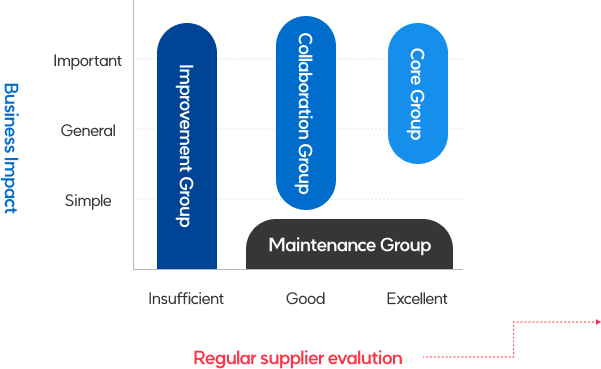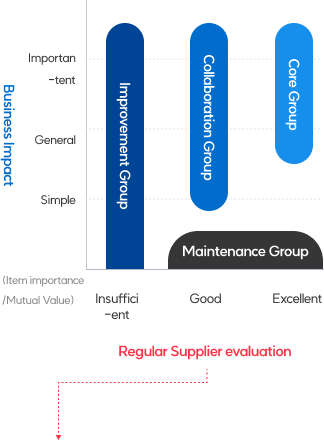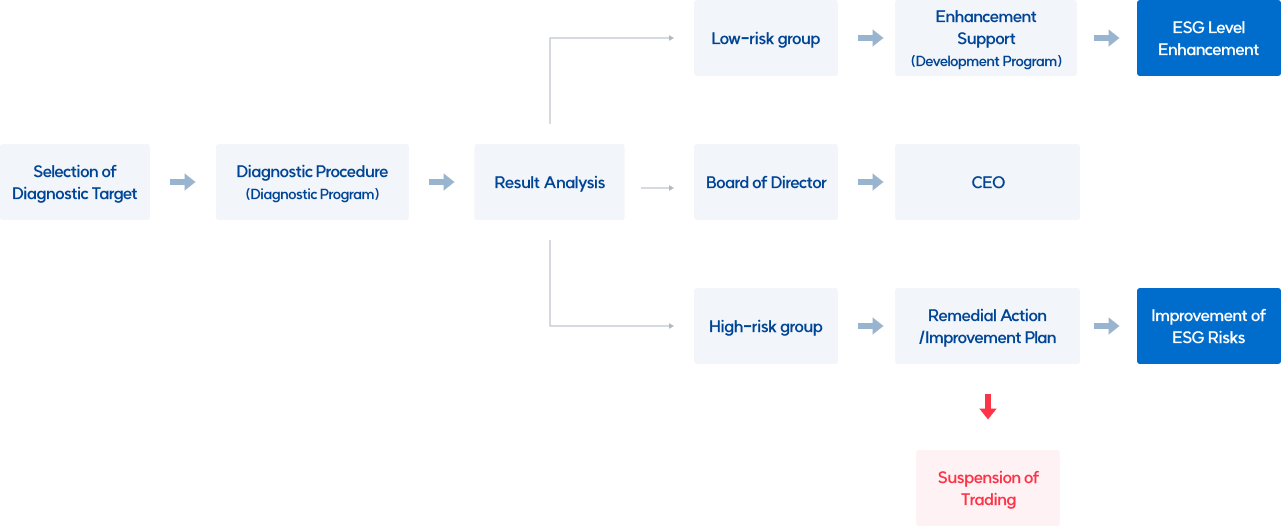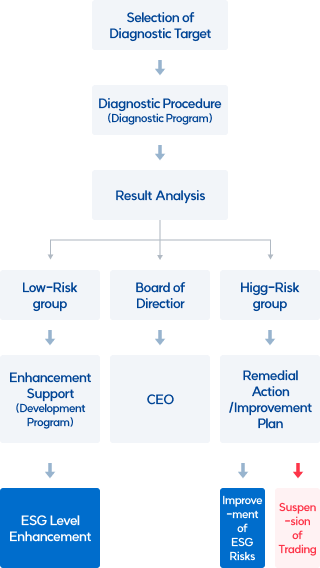ESG is an acronym for Environmental, Social, and Governance, which represents the first letters of each term in English.
It has gained attention as a critical issue for achieving the sustainability of corporate management.
 Environmental
Environmental
 Social
Social
 Governance
Governance
In the past, financial metrics that focused on how much profit a company made were considered important in corporate valuation. However, nowadays, there is a growing recognition that non-financial values such as climate change and social responsibility are more substantial in evaluating a company's worth. As a result, stakeholders such as shareholders, creditors, and governments are demanding ESG (environmental, social, and governance) as a non-financial value in addition to financial metrics when evaluating a company's value.
More than ever before, there is heightened global interest in supply chain risk due to natural disasters, interstate wars, COVID-19 lockdowns, logistics crises, and other challenges. From a business continuity management perspective, maintaining the sustainability of global companies like Hyundai Steel requires evaluating the sustainability of their suppliers who provide goods and services to Hyundai Steel, as it is an important issue.
Hyundai Steel adopts "Supply Chain ESG Management" as a key management policy among various ESG management strategies, and continuously strives for improvement based on this policy. It aims to contribute to the establishment of a competitive steel ecosystem through the sustainable development of the supply chain.
Hyundai Steel regularly diagnoses the ESG management environment of its partners and provides professional advice and support for improving their ESG performance. Furthermore, it promises to conduct ESG management environment diagnoses for partners within the scope that does not interfere with their management. Improving and enhancing partners' ESG performance is based on their voluntary participation and is reflected in Hyundai Steel's purchasing policies.
① Hyundai Steel's procurement policies are operated in conjunction with the Supplier Code of Conduct and are continuously reviewed to
prevent potential conflicts with ESG requirements.
② Suppliers may be excluded from contracts if they fail to achieve the minimum ESG requirements within the specified period.
③ The evaluation of suppliers' operations takes into account their ESG performance, providing an opportunity for superior-performing companies
to be selected preferentially.
④ Hyundai Steel regularly conducts training for internal purchasers and/or internal stakeholders to implement the ESG-based procurement strategy.
Based on the business impact of the purchased items and the regular evaluation results of suppliers,
Hyundai Steel determines the group (core/cooperation/maintenance/improvement) of each supplier.
In addition, during the regular supplier evaluation, additional points are given to suppliers with the highest ESG evaluation scores for the year,
and incentives are provided when selecting excellent suppliers


| Category | Evluation Item |
|---|---|
| Business Environment | Credit Rating, Debt Ratio |
| Competence | Outsourcing Dependency, Construciton Permit. Distribution Capability etc. |
| Performance | Delivery Performance, Material Savings Rate, Delivery Delay Rate etc. |
| ESG | ESG Evaluation Score(Extra Points), Safety Violations (Deductions) etc. |
Hyundai Steel aims to build a sustainable supply chain to ensure business continuity and support the creation of a competitive steel ecosystem. It provides assistance to its partners to achieve this goal.
Hyundai Steel categorically rejects goods and services that are provided in unethical, environmentally harmful, and socially detrimental ways.
A) Hyundai Steel conducts ESG evaluations for all its partners.
B) Hyundai Steel provides consulting and support to improve partners' ESG performance.
C) Hyundai Steel differentiates its business relationships based on partners' ESG performance.
Building a Sustainable Supply Chain
⦁ Regular evaluations of
trading partners
⦁ ESG evaluations for new
registered companies
⦁ Enhancing human rights and
labor standards
⦁ Improving environmental performance
⦁ Enhancing ethical and governance
standards
⦁ Internal education for purchasing
managers
⦁ Aligning purchasing policies with
ESG risk levels
⦁ Supporting mutual growth for
enhancing ESG performance
⦁ Exclusion of transactions if ESG
requirements are not met
We conduct ESG assessments for key supply chain partners to identify potential risks and provide support for improvements.


① A systematic evidence verification process is conducted for the written evaluation of suppliers during the ESG level diagnosis of partners.
② Concurrent field evaluation of suppliers by contracted consultants is carried out during the ESG level diagnosis of partners.
③ Supplier evaluation (either written or on-site) is conducted using the standards and methodologies of recognized industry or multi-stakeholder initiatives.
(OECD Multinational MNE Guidelines, ILO Fundamental Conventions, ISO26000, UNGPs, TCFD etc.)
① Hyundai Steel conducts training for partners on supplier ESG programs, processes, and requirements.
② When providing information on the results of the partner's ESG level diagnosis, relevant information is provided so that it can be compared with
the same industry group.
③ Hyundai Steel supports professional consultation through contracted consultants for the implementation of partners' ESG corrective actions.
④ Hyundai Steel operates and supports professional programs for the enhancement of partners' ESG capabilities.
 EEnvironmental
EEnvironmental SSocial
SSocial GFinancial
GFinancial